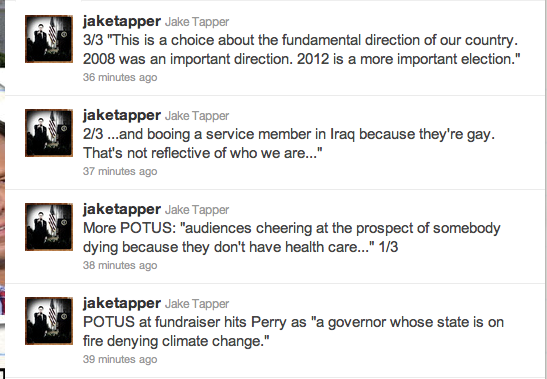– Mexican drug cartels murder Maria Elizabeth Macias-Castro, editor of the Primera Hora newspaper, for using social media to report on the cartels’ violence.
– Interesting: Greta Van Susteren defends CNN from progressive rage over the CNN/tea party debate.
My thought? The critics are silly. The critics have way too much time on their hands. Don’t you judge the quality of the debate largely by the questions asked of the candidates and thus eliciting information?
Wolf Blitzer – a pro – did a good job anchoring the debate and asking important questions. To the extent others asked questions, as far as I can remember, I found them probative of the candidates. Questions were asked…and questions were answered. We got information. Isn’t that what a debate is for? To hear what the candidates have to say? Does it really matter who asks? Silly… silly.
So now there is hand wringing among journalists about who CNN teamed up with to ask questions?? Upset with CNN about that? Really?? I don’t think CNN should spend one second getting down in the weeds answering the critics on this.
– Traditional television prepares for a fight:
A 2010 Forrester study showed that for the first time, Americans now spend as much time on the Internet as they do in front of the TV. Is it inevitable that like print media, consumers will turn to the Internet for their TV and video content and eventually drain the profits from TV’s ad-driven business model? According to Pew’s annual State of the Media report, local TV news is still the No. 1 news source for the majority of people, and it still leads in revenues. The Web came in second. While safe for now, the TV industry is on high alert, dragging its feet, but substantially better prepared to protect its turf than its print brethren were.
It is now widely accepted by the major industry stakeholders, content owners, MSOs, CE manufacturers and new startups that the following trends are unavoidable:
- Consumers will demand linear and on demand, short-form and user generated videos, to be viewed anytime, anywhere and on multiple devices. I believe that companies that build models to meet that demand will win. Those that deny it will go on life support.
- TV rooms in homes will have multiple screens running simultaneously, presenting a much better form factor to interface with the TV set than the traditional remote control. Most new TV-viewing devices will be Internet connected in 10 years.
- A substantial percentage of programming will have on demand, time shifted and interactive capabilities. New formats of programming with embedded interactive applications will emerge, and social TV will take off.
- Advertising will be targeted and personalized, at the individual and household levels, using legacy data from the settop box as well as ongoing rich data being generated every day, unless regulators step in to over restrict that. Smart marketers are already challenging the convention of TV time buying by demanding the same accountability that they are getting in their online buys.
– The Online News Association publishes its 2011 Online Journalism Award Winners.

COMMENTS
Please let us know if you're having issues with commenting.